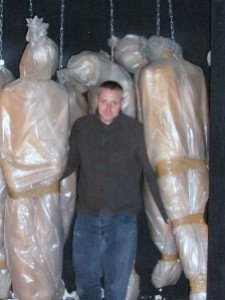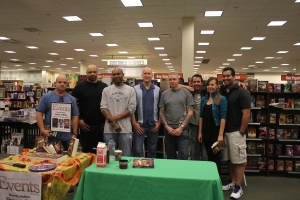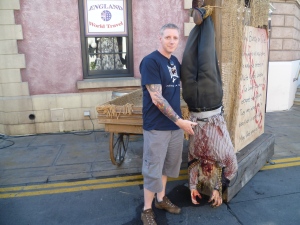“These people are not make believe, they blend into society like chameleons.”
 Having written a serial killer novel so successful, in the shape of The Kult, that it’s been optioned for a film and with a follow up in progress, Shaun Jeffrey is becoming somewhat of an authority on serial killers in fiction. It was for this reason that I thought it was high time I caught up with Jeffrey to speak exclusively about serial killing.
Having written a serial killer novel so successful, in the shape of The Kult, that it’s been optioned for a film and with a follow up in progress, Shaun Jeffrey is becoming somewhat of an authority on serial killers in fiction. It was for this reason that I thought it was high time I caught up with Jeffrey to speak exclusively about serial killing.
Jeffrey is quick to cite the likes of Ed Gein, Son of Sam and Jeffrey Dahmer as the initial attraction to writing about serial killers, in essence he points out that we’re dealing with, “average, attractive, successful people with one thing in common. They kill for the sake of killing. Love them (and believe me, some people do) or hate them, serial killers hold a deep fascination. They have embraced their dark side. Of course not all serial killers are the same, but they seem to have scant regard for human life. Their only aim is to kill and to keep killing. These people are not make-believe beings. They are not vampires or zombies. These are real people. People that blend into society like chameleons. Your friends. Your neighbours.” Musing on his attraction further, “I think that’s what attracted me to writing about them. To all intents and purposes, they are people like you or I, people we could know, except they don’t function within people’s accepted boundaries. They don’t abide by the rules. And to me, that makes them the ultimate monsters.”
“I don’t think I could empathise. They kill people!”
It’s essential to carry out research when preparing for any creative pursuit. When asked if Jeffrey assumed the mindset of a serial killer he admitted that, “The only way to truly embrace my subject matter was to become what I wrote about, so I went out and killed people over a period of six months.” Fortunately he laughed this off and confessed this to be untrue adding, “To be honest I don’t know whether ‘assumed the mindset’ is the right term, as I doubt I could really get inside the head of a killer, but I tried my best to walk in their shoes. I first had to do a lot of research into various killers, trying to find what makes them tick. But I think ultimately, nobody really knows, which is why when you’re writing about them you can have a pretty free rein. Of course there are supposed set patterns of behaviour, but as everyone is different, they don’t all follow them.” Although Jeffrey took on the persona of the killer, empathy presented a problem, “To be honest I don’t think I could empathise with a serial killer. They kill people! If one of my relatives became a victim, nothing could make me empathise with said killer, so putting myself in the shoes of the victims’ relatives, they don’t deserve sympathy. In my novel, The Kult the killer has no boundaries. Old, young, crippled. They were all targets, but for a specific purpose, which becomes apparent if you read the book. My killer had a reason for the killings, and he was totally aware of what he was doing and why he was doing it, so yes, if you know what you’re doing, I do think it makes the crimes more heinous. These aren’t then random crimes. They are premeditated.” 
The horror scribe is quick to point out the potential for serial killers everywhere, “As the world’s population is now the biggest it’s ever been, proportionally there must be hundreds of serial killers roaming the countryside, towns and cities. But I wonder whether percentage wise the number is greater. People like to blame some of the crimes on violent games and films, but if that’s the case, what about the people who have killed for their country? Throughout history people have killed. Vikings. Romans. Huns. Greeks. Epic battles where they killed for real, with primitive weapons that would have had devastating results on their victims. Then in the theatre of modern warfare, people the world over are currently engaged in killing. Not in a game, but in real life. But do they all turn into psychotic killers? Having taken a life, does every ex and currently serving serviceman return home from a tour of duty and become a serial killer? No. If they did, the bodies would litter the streets. Perhaps some got a taste for killing, but they are certainly not all psychotic. I think that to become a serial killer the seeds are deep rooted and any form of external trigger could only hasten what is already growing deep inside.”
“He chained a girl to a post and used a razor embedded vibrator on her”
For those uninitiated in horror the subject content and graphic depictions of violence may be too much. Jeffrey admitted that on occasion he has faced criticism, “Some people have said that they find The Kult too graphic, and that they don’t like seeing some of the story from the killer’s point of view.” He created more of a stir when he showed a former colleague one of his short stories, “it made a female work colleague feel as though she was going to faint.” Not one to pass up an opportunity to hear a faint inducing story I asked Jeffrey to divulge more information, “It was a nasty little tale about a man who videos his victims as he tortures them. In this particular instance he chained a girl to a post and used a razor embedded vibrator on her. I guess it wasn’t pleasant.” In addition to razor clad vibrators, Jeffrey has also shocked with a story entitled The Fat Man, “it’s about a butcher who baked his victims in his pies, and who recited the tagline “Meat is murder” which summed it all up in his mind. I believe a number of people complained to the publisher about that one. But my intention has never been to shock.”
 As a man who doesn’t go out to offend, I wondered if Jeffrey had any boundaries and absolute no-go areas, “Because writing is a creative art, the only boundaries should be your imagination. I don’t set specific boundaries, but then I don’t set out to intentionally shock. I write about what I want to write about, whether it be serial killers or monsters. But I guess in a way I do set a boundary because I don’t want to turn people off by going too far. Actually my current work is a lot more restrained than my earlier work. Whether this is just because I’ve matured as a writer or as a person, I don’t know. I do know I wouldn’t want my 8 year old son to read any of it, so the only boundary in that respect is that the audience has to be old enough to read it, but funnily enough, I don’t think books come with age restrictions, which is strange considering some of the contents are certainly not suitable for a young reader.”
As a man who doesn’t go out to offend, I wondered if Jeffrey had any boundaries and absolute no-go areas, “Because writing is a creative art, the only boundaries should be your imagination. I don’t set specific boundaries, but then I don’t set out to intentionally shock. I write about what I want to write about, whether it be serial killers or monsters. But I guess in a way I do set a boundary because I don’t want to turn people off by going too far. Actually my current work is a lot more restrained than my earlier work. Whether this is just because I’ve matured as a writer or as a person, I don’t know. I do know I wouldn’t want my 8 year old son to read any of it, so the only boundary in that respect is that the audience has to be old enough to read it, but funnily enough, I don’t think books come with age restrictions, which is strange considering some of the contents are certainly not suitable for a young reader.”
In my mind Jeffrey saying he set boundaries so as to not turn people off by going too far could give rise to a conflict of interests. If Jeffrey creates a character who one day decides he/she wants to go off and commit the most depraved and twisted acts surely Jeffrey has a duty to the credibility of the character to allow this to go ahead. I asked Jeffrey whether he felt modification for the sake of keeping the audience on-side was disingenuous and took something away from the character, “I want my bad guys to be bad guys. But even though they are bad or nasty or whatever, I think people still have to associate with them. They still have to have human foibles. I recently changed a character in my novel, Deadfall, but only because it was pointed out that she didn’t seem very nice, and as such why would her boyfriend want to stay with her? Hopefully this has helped her become more likeable and also more ‘real’.”
“It’s all about wielding the right words.”
To further test Jeffrey’s limits and perhaps his patience I asked if he would be prepared to depict child molestation if his character sought this out, “As for the question of whether I would go into graphic detail about a child molestation, then the answer would be no. Some things are best left to the imagination and as a result can be all the more powerful. If you can paint a picture in someone’s head, then the result can be better than any film image because you’ve touched that person on a cerebral level and left a permanent memory in their mind. It’s all about wielding the right words.”
Jeffrey is very open about growing up in close quarters to corpses, “I did grow up in a house in a cemetery where my grandparents were the caretakers so I guess I grew up around death.” Although this doesn’t mean Jeffrey has seen an abundance of the dead, “Luckily once the deceased arrived at the cemetery they were inside coffins, so no, I’ve not seen my fair share of corpses. I’d be a little concerned if I had seen them I guess. But I have friends that work for the police department who have seen quite a few corpses, and their way to cope with it is through humour. They make jokes about it. I guess this is their way of protecting themselves from the real horror of the situation.” 
He wasn’t too fond on the idea of killers keeping victims around the house, “I think I’d rather hang a picture or place a vase of flowers, but each to his own. I imagine that disposing of a corpse is not always that straightforward though, so it’s easier to bury it in your own back garden than risk transporting it to a river or a wood. And it certainly gives fresh meaning to going out to do some deadheading in the garden!”
Veering back towards his literature, Jeffrey explains the sheer pleasure derived from writing about serial killing in The Kult and its sequel, “Despite the dark subject matter they are the two novels I think I’ve had the most fun writing because I let myself go a little more in their execution. For a brief time, I embraced my own dark side, and I hope by doing so that the books have a much darker feel, but that they come across as believable.” In terms of a starting point, “the initial steps basically just involved plotting the stories out so that I would know where they were heading. I didn’t want to start writing them and then realise that I didn’t know where they were going.”
We’ve all heard stories of authors preparing in ritualistic quirky ways, although despite my suggestion Jeffrey wasn’t ready to enter a room covered in nothing but animal flesh, “I’m a vegetarian, so surrounding myself in rotting meat would be a little hypocritical I guess.” When asked if the solitary nature of the serial killer as a subject lends itself to the solitary pursuit of writing, Jeffrey saw similarities but concluded, “when they say the pen is mightier than the sword, if it came down to decapitating a victim I think I’d prefer to use a sword.” For future authors looking to dabble with serial killers he offers this advice, “Don’t hold back. Let your killer develop his/her own voice and set them free. Also read a lot about serial killers so you can get an understanding for the mindset that it takes to kill. Ultimately just have dark fun with it.”
A final cautionary word from Jeffrey when writing, “you never know when the serial killer might take over!”









